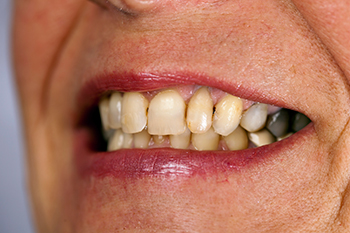What Are The Long Term Effects Of Dry Mouth (Xerostomia)?
 Dry mouth can be very uncomfortable, but it is still very common for people to ignore their symptoms and simply try to ‘live with it’. In fact, an estimated 26% of all seniors over 60 in the US have Xerostomia symptoms.
Dry mouth can be very uncomfortable, but it is still very common for people to ignore their symptoms and simply try to ‘live with it’. In fact, an estimated 26% of all seniors over 60 in the US have Xerostomia symptoms.
The problem is that severe dry mouth (Xerostomia) leads to dire health risks when left untreated. The severity of your dry mouth largely determines how quickly serious problems are likely to develop.
Dry mouth is a serious health concern?
By extension, yes… untreated Xerostomia leads to poor oral health, which causes infections to develop and degrades your immune system. This can lead to a host of life-threatening cardiopulmonary conditions, among other risks.
What’s more, chronic dry mouth robs oral tissues of the lubrication and protection provided by saliva; putting sensitive oral tissues at risk during even routine tasks like eating and brushing teeth. Prolonged reduction of saliva flow will also result oxidative stress, which is becoming increasingly linked to oral cancer.
Read about the important research linking xerostomia and oxidative stress to oral cancer…
And these are just the extreme worst cases… even the ‘minor’ consequences are extremely undesirable.
 A lack of saliva robs your oral tissues of the natural healing properties of antioxidants as well as the lubrication that makes it possible to chew, swallow and speak normally.
A lack of saliva robs your oral tissues of the natural healing properties of antioxidants as well as the lubrication that makes it possible to chew, swallow and speak normally.
Without the protection of antioxidants, your gums are left defenseless against gingivitis and other periodontal disease. Gums recede from teeth, allowing plaque to build up quickly; in turn causing tooth decay and gum disease. Tooth decay and gum disease expose you to bacterial and fungal infections, which develop into very serious conditions over time.
If Xerostomia goes untreated, you may experience discomfort due to:
| Sensitive Teeth & Gums | Difficulty Eating | Oral Inflammation |
| Loss of Appetite | Atphous Ulcers (Canker Sores) | Difficulty Speaking |
| Mucositis | Bacterial Infection | Enamel Demineralization |
| Fungal Infection | Tooth Decay & Loss | Periodontal Disease |
Not to mention the psychological impact of the persistent discomfort, embarassment. Withdrawing from friends and loved ones due to depression can be dangerous as any of these effects.



 Free radicals from the food and drinks we consume, tobacco and alcohol products and the environment around us cause damage to oral tissues over time.
Free radicals from the food and drinks we consume, tobacco and alcohol products and the environment around us cause damage to oral tissues over time.